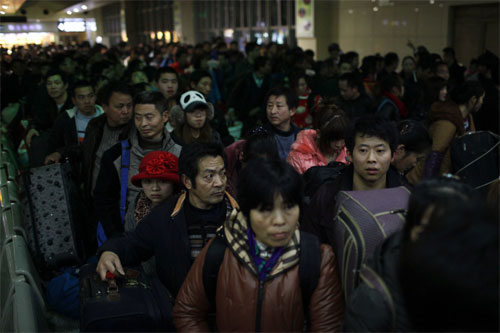Hard to get one ticket home
Updated: 2013-02-02 14:22
(chinadaily.com.cn)
|
|||||||||||
 |
|
Passengers wait for a Chengdu-bound train at a railway station in Shanghai, January 15, 2013. The busiest Spring Festival travel period will likely span from January 26 to March 6, according to the Ministry of Railways. [Photo/Xinhua] |
An upset passenger who wants to head back to his hometown in Wuhan city, Hubei province, from Nanjing, Jiangsu, for Spring Festival was angry as he tried to buy a train ticket on www.12306.cn, the official ticketing website of the Ministry of Railways.
Seconds after the set time for buying tickets for that route, the man named Li found they were sold out, Yangzhou Evening News reported on Tuesday.
“I tried to buy a ticket from Nanjing to Wuhan for Feb 8, so I was waiting in front of my computer on Jan 20, on time, 20 days before my departure.” Li said. “I waited for half an hour in vain.”
And he was even more frustrated to learn that a ticket scalper could get him a ticket, one day before his departure.
Later Li learned that tickets were not released every day of the pre-sale period. Instead, a block of tickets appear every afternoon for the next day’s trains on the ticketing website.
The reporter at Yangzhou Evening News discovered that same problem for many trains from Nanjing to Beijing and Jiujiang city, Jiangxi province.
The “secret” may have been known to only a few people before, like the ticket scalpers.
The secret of “reappearing seats” lies in the rollover seat principle of the existing ticketing system,” Yangzhou Evening News said.
For example, the train from Shanghai to Wuhan goes through Nanjing, and only when a ticket from Shanghai to Nanjing is sold will one ticket from Nanjing to Wuhan be available.
Thus, a large number of tickets are being held at Shanghai Railway station, while tickets from Nanjing to Wuhan are still in short supply. Until one day before departure, when thousands of tickets suddenly are available at Shanghai Railway stations.
Though later Shanghai railway station explained that the reappearing available seats for the two trains to Wuhan by Nanjing were because it decided to add cars to the trains as an emergency reaction for growing passenger numbers, what made passengers angry is that railway authorities are giving the green light to tickets scalpers instead of letting passengers know the changes on time.
There is still rampant illegal train ticket scalping even though a real-name ticket-selling system was launched in 2011 in a bid to ease the problem of difficulty in buying train tickets.
Knowing the tricks of buying tickets online, ticket scalpers stock up on tickets beforehand. And when passengers find no tickets are left and decide to buy tickets from them, they cancel their orders and use clients’ ID to buy at ticket windows at the same time, Xinhuanet reported.
“We have already bought off the ticket sellers at the stations,” a ticket scalper told Xinhuanet. “We don’t need to queue at the ticketing windows, which makes our business convenient.”
The exorbitant profits made possible by the giant gap between demand and supply of tickets are behind the problems. The fact that the staff at railway authorities are also involved in this illegal business chain adds to the complexity of the problem, said Huang Chengfeng, a professor at Chongqing Jiaotong University.
He urged transport authorities to focus their efforts on providing transparent,timely and effective information to homebound travelers.
“The authorities also should intensify supervision on their staff and crack down on illegal tickets scalping at the same time, to ensure order while dealing with the travel peak during Spring Festival,” he said.
Last month, China’s Ministry of Railways announced that railways nationwide would embrace a travel rush of 224.5 million trips in 40 days of chunyun, the Spring Festival travel rush, which started on Jan 26, about 5.6 million trips a day on average.
With growing pressures on the demand for train tickets and visits on the online ticketing system as the holiday approaches, the ministry vowed greater efforts to deal with the situation with a series of measures, including extending the pre-sale periods for online and telephone ticket reservations and expanding the response capabilities of the system.
But to queries from the public about declaring the total number of available train tickets and the distribution of tickets for different channels of sales during the 40-day travel rush, the ministry cannot offer an answer yet, Beijing News reported.
“Actually, as long as the travel rush is still increasing and the national transportation capacity is limited, the situation of short supply in train tickets may not be solved,” Gu Jun, a sociology professor at Shanghai University, said in an opinion piece on Oriental Morning Post on Jan 29. “It is now the inconvenience in ticket purchases and lack of transparency in information disclosure that has led to public complaints,” said Gu.
The ministry should first solve the long-term systematic problems involving internal management and information-sharing among local railway administrations and technological barriers in the ticketing system, which cost hundreds of millions of yuan, Gu said.
Related readings:
Ticket changes aim to ease the load in great migration
No ticket home? Find a free ride
2 caught in fake train ticket scam
Line cutting train ticket apps still available
Railways reject calls to drop ‘no-seat’ ticket price
Today's Top News
Police continue manhunt for 2nd bombing suspect
H7N9 flu transmission studied
8% growth predicted for Q2
Nuke reactor gets foreign contract
First couple on Time's list of most influential
'Green' awareness levels drop in Beijing
Palace Museum spruces up
Trading channels 'need to broaden'
Hot Topics
Lunar probe , China growth forecasts, Emission rules get tougher, China seen through 'colored lens', International board,
Editor's Picks

|

|

|

|

|

|





